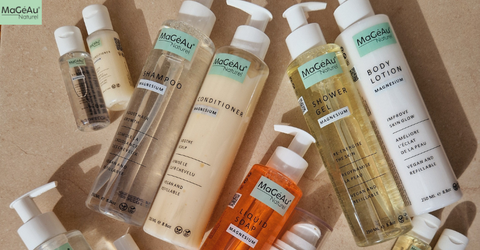In the vast world of skincare, there's an array of products enticing you to incorporate them into your routine. However, before diving in, it's crucial to understand the ingredients they contain. Mixing serums with creams, for instance, demands awareness of their active ingredients to avoid potential skin damage.
To help you determine which skincare ingredients are good to combine together to boost your skincare routine efficacy, we did a detailed research and collected expert advice and dermatological insights.
Don’t Mix Retinol with Vitamin C
Retinol is a powerful anti-aging ingredient. It works wonders with resurfacing textured skin, reducing acne of all types, and reducing hyperpigmentation and redness. It stimulates the skin cell cycle, holds collagen together and promotes elasticity. Meanwhile, Vitamin C is a power-pack ingredient that illuminates the skin achieving bright, radiance, vitality and glow.
However, according to dermatologists mixing retinol and Vitamin C causes hyper-reactivity, excessive exfoliation and dryness. Mixing these two ingredients increases propensity for blemishes on the skin especially without applying adequate sunscreen protection.
Don’t Mix Retinol and Hydroxy Acids
Hydroxy acids are organic carboxylic acids and are classified according to the molecular structure as α-hydroxy acids (AHA) and β-hydroxy acids (BHA). These AHAs and BHAs are chemical exfoliants, rejuvenating the skin's texture by getting rid of dead skin cells to give you smooth baby-like skin.
Mixing the two ingredients or using at the exact time can cause dryness and irritation. However, if you still want to include both the ingredients in your daily skin care routine apply hydroxy acid first and wait for at least 30 minutes to allow your skin’s pH level to return to normal. And, then apply retinol.
Don’t Mix SPF and Makeup
Shielding the skin from harmful UV rays demands the diligent use of SPF products. Sun exposure can be incredibly harmful to the skin if not prepared properly which is the reason why using skincare that contains SPF in your daily routine to protect the skin from harmful UV rays is needed and recommended.
Mixing or using SPF with makeup or heavy moisturisers can dilute SPF’s effectiveness. SPF typically requires the skin to be bare or only containing other skincare products to absorb adequately. For optimal protection, it is recommended to avoid using SPF with makeup or to apply sunscreen first before applying anything on the face. Give your skin two minutes to let the sunscreen sink in, allowing it to absorb before proceeding with makeup application.
Don’t Mix Benzoyl Peroxide + Vitamin C
Benzoyl peroxide is an antibacterial and anti-inflammatory agent that treats acne, while Vitamin C is a powerful antioxidant that protects the skin from UV damage, brightens the skin and helps lighten dark spots.
Combining, mixing or layering the benzoyl peroxide with Vitamin C can lead to irritation on skin. Experts do not recommend using the two products together since benzoyl peroxide will oxidise Vitamin C and make it ineffective. If you still want to incorporate these two products in your skincare routine then apply vitamin C in the morning and benzoyl peroxide at night.
Crafting a Safe Skincare Routine
Like Batman and Robin, there are certain skincare ingredients that just work better together and others paired together that can be really harmful on your skin and can cause irritation, redness and dryness. Prioritising ingredients awareness while choosing your skincare products is very important.
Remember, it's wise to avoid products with overlapping functions or potentially harmful combinations.
We've outlined the risky combinations that could be harmful for your skin and provided safer alternatives for those determined to use them. Share with us which products you are using in your daily skincare routine and explore our website to discover why MaGéAu Naturel skincare offers a safe alternative for all skin types and the whole family.





Comments (0)
There are no comments for this article. Be the first one to leave a message!